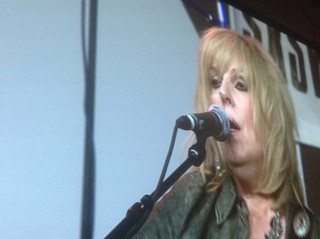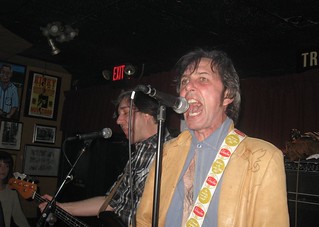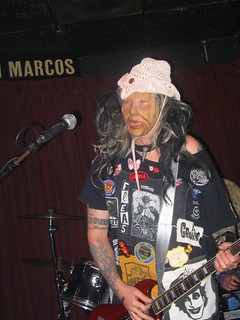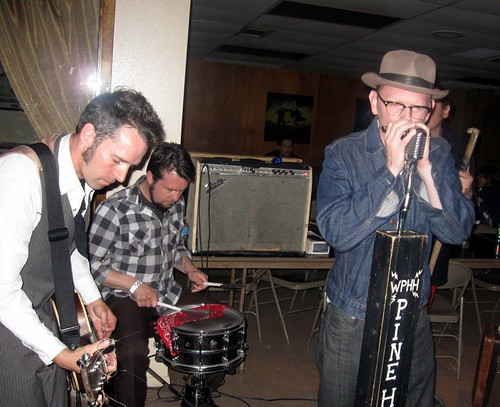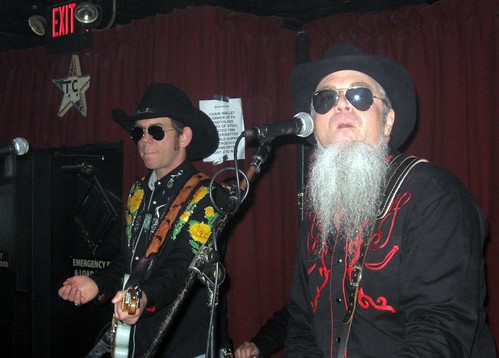 Untitled
Untitled
As some of you know, one of my duties as a mild-mannered newspaper reporters is doing a weekly rock 'n' roll column for Pasatiempo, the arts and entertainment magazine of The Santa Fe New Mexican. In fact, I recently celebrated the 25th anniversary of Terrell's Tune-up
Here are a few recent columns. I'll update below if anyone is interested.
And you can find 'em all at my music blog
A version of this was published in The Santa Fe New Mexican
Feb. 7, 2014
Has Les Claypool “gone country”? Not exactly. His new album, Four Foot Shack, credited to Les Claypool’s Duo de Twang, could almost be mistaken for “Primus Unplugged,” except for the fact that Claypool’s usual sidemen have been replaced here by guitarist Bryan Kehoe. The group even plays a couple of acoustic takes on Primus classics: “Jerry Was a Racecar Driver” and “Wynona’s Big Brown Beaver.”
Like Primus, Duo de Twang features Claypool’s bass as basically a lead instrument. Kehoe, reportedly an old high school buddy of Claypool’s, plays a lot of slide guitar. The only percussion is what Claypool calls a “mini-tambourine-doohickey” played via a foot pedal.
The duo originally formed to play the Hardly Strictly Bluegrass Festival in San Francisco. They definitely lived up to the “hardly strictly” part and then decided to make this album and do a small tour. (Alas, the closest they’re coming to New Mexico is Austin, during next month’s South by Southwest festival, and Snowmass, Colorado, in June.)
Too be sure, it’s obvious that Claypool likes country from 40 or 50 years ago. On this album you’ll find covers of Johnny Horton’s 1959 hit “The Ballad of New Orleans” (Claypool takes it, as Horton might have said, to places where a rabbit wouldn’t go) and Jerry Reed’s 1970 swamp-country masterpiece about a one-armed Cajun alligator hunter, “Amos Moses.” This is the second time Claypool has recorded “Amos.” Primus also took a crack at it on the 1998 CD Rhinoplasty.
While the Horton and Reed songs were big hits, Claypool also plows more obscure country-music ground. The duo does a version of “The Bridge Came Tumblin’ Down,” originally performed by Canadian country star “Stompin’” Tom Connors, who died last year at 77. The song has a good basic Johnny Cash chunka-chunka beat, with Kehoe doing some of his best slide work on the cut.
In many ways, Duo de Twang’s relation to country music is similar to what you hear on Merles Just Want to Have Fun, the album that Bryan & The Haggards and Eugene Chadbourne released last year. Both groups use C&W as a jumping-off place — before they jump into the sonic abyss.
 But no, even with these songs, you’re never going to see Duo de Twang on the Grand Ole Opry. And you especially aren’t going to hear Claypool’s “Red State Girl,” a near-metallic-sounding ditty about a woman with breast implants made of recycled bottles who “wants to grow up to be Sarah Palin” and is fortunate enough to meet a young man with a tattoo of the Budweiser frogs (as well as a naked picture of the former Alaska governor, or so Claypool says).
But no, even with these songs, you’re never going to see Duo de Twang on the Grand Ole Opry. And you especially aren’t going to hear Claypool’s “Red State Girl,” a near-metallic-sounding ditty about a woman with breast implants made of recycled bottles who “wants to grow up to be Sarah Palin” and is fortunate enough to meet a young man with a tattoo of the Budweiser frogs (as well as a naked picture of the former Alaska governor, or so Claypool says).
As Claypool has shown with Primus and his many side projects, he loves wacky covers of a wide variety of songs, and despite the band’s name, most of the covers on this record are not from the world of country. On Four Foot Shack, he and Kehoe do a suave remake of the iconic surf instrumental “Pipe Line” (including “la la la” vocals on the bridge, where they sound like some lost battalion of the Russian army). The Duo makes Alice in Chains’ nightmarish “Man in the Box” even more nightmarish (with bluegrass mandolin). And the Bee Gees’ disco landmark “Stayin’ Alive” is transformed into an alien hoedown.
I still believe that Claypool’s most satisfying album is Primus’ Pork Soda, released more than 20 years ago. But even though this one doesn’t reach that level, it’s a doggone fun record. I hope that some staunch fans of acoustic roots music open their ears to it.
Also recommended:
* Spanish Asshole Magnet by Billy Joe Winghead. No, Billy Joe Winghead is not a person. It’s a band name, like Jethro Tull. Fronted by singer John (not Jono) Manson, the band, from my hometown of Oklahoma City, plays raw, obscene, metal-edged scuzz rock. I hear echoes of The Dictators, Joan Jett, Nashville Pussy, and The Hickoids (hey, they’re on The Hickoids’ label, Saustex) but definitely not Jethro Tull.
Did I mention obscene? Yes, nearly every song is packed with lewd language that unfortunately will limit radio play. Too bad. There are lots of rocking and frequently catchy tunes here. The title song is a tale of decadence and perversion that name-checks Frankie Goes to Hollywood and lifts a riff from the Hendrix song the title parodies.
Songs like “Dayglo Blacklite,” “Devil’s Advocate,” and “Gravedigger” are hard-punching rockers, the latter with a melody inspired by The Runaways’ signature song “Cherry Bomb.” Meanwhile the ferocious “Okie, Arkie and Tex” sounds like a grittier version of Guns N’ Roses before that band sunk beneath our wisdom like a stone. Billy Joe proves they can actually play it pretty on “Lana Don’t Go,” which has musical allusions to The Shangri-Las, Phil Spector, and other ’60s teen-drama rock.
Billy Joe also does a version of “Planet of the Apes” by garage-punk idols The Mummies. The band does it justice, but it’s only the second-most-remarkable cover on this album.
Without a doubt, the highlight here is the inspired medley of Broadway showtunes — I’m not kidding — that Billy Joe calls “Springtime for Argentina.” Yes, this is a combination of “Springtime for Hitler” from Mel Brooks’ The Producers and “Don’t Cry for Me Argentina” from Andrew Lloyd Webber and Tim Rice’s Evita. It’s a magical Okie punk-rock ode to a dictator and the wife of a dictator. The track becomes even more demented when you watch the video. It’s a crazed fascist puppet show that shouldn’t be missed.
This is followed by a slow, dreamy, synthy song called “With a Hate Like Mine.” After so much breakneck craziness from the previous songs, it might seem at first as if Billy Joe just ran out of steam. But as the six-minute song drones on with its iggly-squiggly computer effects and smoky atmospherics, it seems to transport a listener to a distant crazy dimension.
Enjoy some videos:
A version of this was published in The Santa Fe New Mexican
Jan. 31, 2014
When you think of country-folk songwriters from Texas, you probably think of pickers and singers like Townes Van Zandt, Guy Clark, Ray Wylie Hubbard, The Flatlanders and Terry Allen. Not to mention Willie and Waylon and the boys.
Here's a couple of younger singer-songwriters from the Lone Star state whose music definitely is informed by all those greats, even though they don't sound much like your stereotypical Texas troubadours. Both these guys started out as "one-man bands," both are in their late 30s and I suspect they share a lot of the same fans. But they don't sound much like your typical one-man bands either. And come to think of it, they don't sound much like each other.
* There Will Be Nights When I'm Lonely by Possessed by Paul James. Though he frequently sings like a man possessed, this singer's name isn't "Paul James." It's Konrad Wert, a preacher's son born and raised in a Mennonite family in Immokalee, Fla. “Paul James” is a combination of his father’s and grandfather’s names. Wert's day job is being a special education teacher in an elementary school.
Jeopardizing forever his standing with one-man band purists (I suppose there are some of those out there) Wert on this album is joined by by an ad hoc band on some cuts, including a couple of Texas heavyweights -- steel guitarist Lloyd Maines and harmonica honker Walter Daniels. Fortunately, the extra musicians only enhance and don't clutter Wert's sound.
Possessed fans immediately will know this record, released late last year on the Hillgrass Bluebilly label, is a Possessed by Paul James album by the opening notes of the first song, "Hurricane." It's Wert's fiddle, screeching, but not quite abrasive, soon followed by foot-stomping and a stand-up bass, drums and well as excited yelps by Wert, perhaps an invocation to the swamp demons who haunt his music.
Wert's on the fiddle on the next tune, "Songs We Used to Sing," as well. It's upbeat with just a hint of pop in the melody, though you're not likely to hear this on commercial radio. Drummer Cary Ozanian gets a good workout on this one.
On "Heavy," Wert ditches the band and switches to banjo. "Oh this life can get heavy," he sings in the refrain. The words seem to underscore the pressure that seems to propel his soaring vocals. "Dragons," also featuring Wert on banjo, is a shambling roadhouse blues. Wert roars and growls as Daniels blows sweet riffs on his harmonica. (Wert cleverly sneaks the titles of some his earlier albums in some of the lyrics on these two. His previous record Feed the Family is referenced in the first verse of "Heavy," while in the song "Dragons" Wert sings, "You've left me Cold and Blind," a sly wink to the title of his 2008 album.)
The title song, preceded by a minute-long fiddle solo, features an even more-intense-than-usual Wert stomping, fiddling and pleading for love, even though he sees some rough times "when we cry ourselves to sleep." The darkest song here undoubtedly is the slow, minor-key "Pills Beneath Her Pillow." It's about reckless and weary lovers. The woman keeps pills under her pillow, while the man keeps guns under his.. Wert in the chorus sings "Everyone is searching for love, everyone is fighting for love, everyone is killing for love and baby, oh, I'm dying tonight ..."
My favorite song on There Will Nights at the moment is a lighter piece, a sweet love/lust tune called "38 Year Old Cocktail Waitress." With some honky-tonk steel from Maines, Wert sings, "On the golf course road down in Mexico, she's my beauty queen / She wears a pink bikini, drinks an appletini, oh she's quite the scene.
* Nothin' But Blood by Scott H. Biram. Now I doubt that Biram would ever sing the praises of a woman who drinks appletinis. He seems like he'd be more attracted to straight-whiskey types. In fact, "Only Whiskey" is the name of one of the rowdiest tunes on, this new album by gruff-voiced Biram. "Only whiskey can sleep in my bed," he growls over his distorted electric guitar. (The album is scheduled for release next week by Chicago's Bloodshot Records.)
Like the best of Biram's works, there are plenty of rip-roaring, blues-soaked, booze-fired songs on Nothin' But Blood. "Alcohol Blues," (an old Mance Lipscomb tune) with a guitar hook similar to that in Cream's version of "Crossroads" and a string of obscenities I won't even try to sneak past the editors, definitely is one. And "Around the Bend" and " Church Point Girls" might just be the first recorded one-man metal band tunes in human history. Biram on "Bend" even manages a pretty good parody of the lizard-demon voice you hear in so many death-metal bands.
While Biram sings lustily of drinking, drugging, sex and sin, there are plenty of salvation songs on Nothin' But Blood as well. "Gotta Get to Heaven" is a happy song about a guy who apparently has wrestled with his sinful ways and won. Plus, tacked on at the end of the album are three "gospel bonus tracks" including oft-covered classics like "Amazing Grace" (featuring Biram's harmonica and ambient rain sounds) a rousing "John the Revelator" and one called "When I Die," which is credited to Biram, though it sounds as if it could be a hymn from deep within the foggy realm of American folk traditions.
Speaking of cover songs Biram, performs more of them than usual on this record. Besides the ones mentioned above, he does versions of folk gems like "Jack of Diamonds," I'm Troubled," (which is credited to Doc Watson, though it sounds much older), and Willie Dixon's "Backdoor Man," which is closer to Howlin' Wolf's version than the one by The Doors.
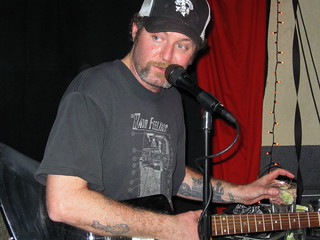 |
| Biram at Corazon, Santa Fe 2011 |
While Biram is known best for his rambunctious and sometimes raunchy material, he also is quite capable of slow, pretty acoustic songs as well. He's proved that before, of course on songs like "Still Drunk, Still Crazy, Still Blue" from Something's Wrong / Lost Forever (2009) and "Broke Ass" from 2011's Bad Ingredients. On the new album "Never Comin' Home" is a sturdy country weeper, while the minor-key "Slow and Easy" is slow, though the narrator, drinking his wine to get "that same old high" sounds anything but at ease.
But the real standout is one called "Nam Weed." It's a story of a Vietnam vet pining about the good old boys back during the war. "Long time, back in Vietnam / I had some friends that could give a damn / They'd roll 'em up and smoke 'em down / Good weed back in Vietnam ..." Here in the USA, however, the nostalgic narrator is doing time for some unspecified crime. "All my friends were over there," he laments.
Both Biram and Possessed by Paul James show that, in case anyone forgot, singer-songwriters don’t have to sound self-absorbed and that folksingers don’t have to be self-righteous And both of them also prove that Texas hasn’t stopped making top-notch troubadours.
Here's a couple of videos:
A version of this was published in The Santa Fe New Mexican
Jan. 24, 2014
Every year about this time I like to look back at some of the albums that I meant to review in this column over the past year but somehow never got around to it. There’s some good stuff here that doesn’t deserve to get left behind.
* The Big Dream by David Lynch. Back when I was becoming a fanatic for David Lynch films like Blue Velvet and Wild at Heart, not to mention his pioneering TV series Twin Peaks, I never imagined that one day I’d be listening to his music. But there were hints even then that he would be responsible for some intense, crazy sounds. Julee Cruise’s mysterious and hauntingly beautiful 1989 debut, Floating Into the Night, is made up of songs composed by Angelo Badalamenti, Lynch’s soundtrack meister at the time, and lyrics by Lynch. But Lynch didn’t do a solo album until Crazy Clown Time in 2011. Though not quite as striking as that album, The Big Dream is a continuation of the shadowy, surreal electro/clunky techno of Crazy Clown Time. If anything, the new work shows more of a country influence. No, you won’t mistake it for Willie or Waylon, but Lynch’s Montana drawl makes him sound like some lost cowboy in the Black Lodge. You have to give him credit. He is one of the few performers I know who can make a lyric like “I went down to the ice-cream store” (in “We Rolled Together”) sound sinister. And, hey, Dylan completists, Lynch does a cover of “The Ballad of Hollis Brown.” It’s not hard to see how this song, based on a real murder/suicide on a South Dakota farm, would appeal to Lynch.
* All Our Forts Are With You by Wild Billy Chyldish & The CTMF. Billy Chyldish, formerly Billy Childish, formerly Steven John Hamper, proves that there’s a thin line between angry young man and grumpy old coot. The songs on this album, according to the Damaged Goods label’s website, have lyrics that go back to 1977, when Billy, then working as an apprentice stonemason in England’s Chatham dockyards, first decided that he wanted to be in a punk band. Many of the songs here seem to be dealing with the death of punk as opposed to its birth. “Three punk rockers, but the punks are dead,” Chyldish snarls in the opening song, “The Headless Flowerpot Girl.” There are songs blasting “The Second Generation Punks” as well as “The Musical Rogues,” which include Nick Cave and The Pogues. (Hey, lighten up, Billy, I like those guys!) And in the title song, Chyldish sings, “I knew you, baby, when you didn’t know punk. … I knew you baby, before the lies of coke.” In addition to the punk-history songs, Chyldish pays tribute to some spiritual mentors. “On Moonlit Heath”has lyrics by British poet A.E. Housman. Even better is a garage-rock attack on Willie Dixon’s “I Just Want to Make Love to You.”
* All That Glitters by Pietra Wexstun & Hecate’s Angels. The third album by Hecate’s Angels is the most down-to-earth CD Pietra Wexstun has ever done — it’s not as otherworldly as Saints and Scoundrels (2004) and especially Hidden Persuader (2001). The emphasis here is on Wexstun’s warm vocals. (Unlike those previous albums, none of the 11 songs on Glitters are instrumentals.) When I say “down-to earth,” I’m speaking relatively. There are plenty of spooky atmospherics, mysterioso lyrics, and outright weirdness here. It’s easy to imagine strange little movies in your mind when listening to her songs. “When The Boys Come Out to Play,” with its ghostly background choruses, ominous melody, and what sounds like a sample of some radio preacher ranting in the background, could almost be the girl cousin of Brian Eno and David Byrne’s My Life in the Bush of Ghosts. Wexstun goes from bossa nova (“Dragging Me Down”) to white funk in “She Done Him Right (Mae West Sutra).” On “Lonesome Stranger” she makes a hammer dulcimer sound like a Martian lyre. My favorite is the opening song, “Take It Away,” which might be described as “rock noir.” I bet Wexstun’s husband, Stan Ridgway (who plays guitar on the album), wishes he’d written this tune.
* Rock Them Back to Hell by Left Lane Cruiser. This is a two-man trash/blues/stompband from Indiana. Like the Black Keys before them, singer/guitarist Frederick Joe Evans IV and drummer/ harmonica honker Brenn Beck have worshipped at the altar of Mississippi hill-country bluesmen like T. Model Ford and R.L. Burnside. Unlike The Black Keys, Cruiser has retained its primitive raunch. Yet the band is not afraid to play it pretty every so often, such as on the sweet and soulful “Coley.”
* Stiff Upper Lip and Trousers to Match by The Mobbs. “Blast Off!!!” — the raucous first track on this album — immediately reminded me of The Hives at the height of their glory. That is, if The Hives had thick Northampton accents. Yes, the guitar/bass/drums garage/punk attack is nothing new. But these guys play it with enthusiasm and humor. They’ve got some fine songs, “The Devil Writhed In,” “Crule Britannia” (is this a nod to the Bonzo Dog Band?), and “A Damned Good Thrashing!” among them.

* The Beautiful Old: Turn of the Century Songs by various artists. This collection, with musical production by Gabriel Rhodes, consists of covers of great old parlor songs from America and the British Isles. The best of these are “The Band Played On”sung by Richard Thompson and Christine Collister. (How could anyone not love this tale of Casey and his strawberry blonde?); “The Man on the Flying Trapeze” by Graham Parker (I still like the version in the Popeye cartoon best, but Parker does a decent job. I never knew this song had so many verses.); and “After the Ball” by Dave Davies (the ex-Kink captures the heartache at the center of this song). By the way, Garth Hudson, former keyboardist of The Band, plays on all three of these plus several more on the album.
* Reverse Shark Attack by Ty Segall & Mikal Cronin. If last year’s Segall album, Sleeper, was a little too soft and introspective for fans of his usual hopped-up lo-fi garage squall, this might be the perfect antidote. Originally released in 2009, the album was rereleased by the In the Red label early last year. With bassist/vocalist Cronin, Segall rips through eight songs with joyful fury. About half are less than two minutes long, but the final track, the title song, is a 10-minute adventure that alternates between quiet, loud, and louder. And if you missed my recent blog post about it, here’s some good news for local Segall fans. He’s playing at High Mayhem in Santa Fe on March 18 and at Albuquerque’s Launchpad the following night.



















